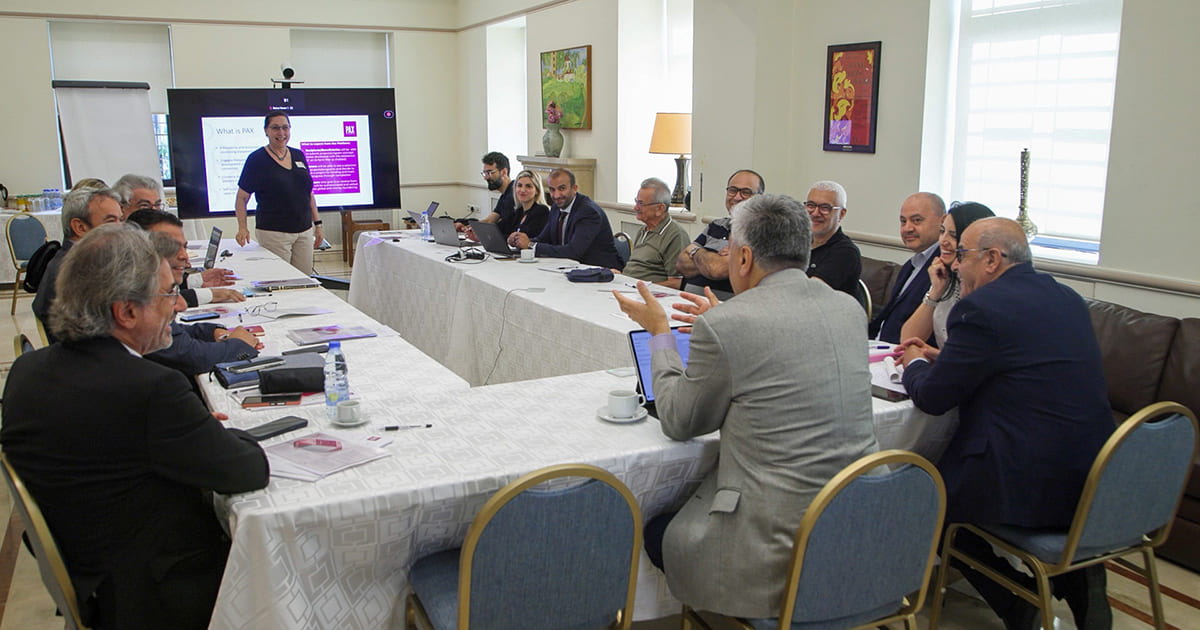From Crisis to Action: LAU and PAX Lead National Water Reform Effort
In a collaborative civic undertaking, LAU hosted a pilot workshop that brought together community and policy leaders to address Lebanon’s water challenges and explore sustainable solutions.
Committed to advancing research-driven, practical solutions that serve the wider community, LAU hosted the first PAX Foundation (PAX) workshop titled Water Sector in Lebanon: Local Issues and Solutions on June 28, 2025, at the Beirut campus.
PAX, an independent organization dedicated to revitalizing Lebanon’s economy through tech-enabled funding and inclusive opportunity, partnered with LAU to bring together a diverse group of stakeholders—including municipal leaders, legal and technical experts, and academics—for in-depth discussions on sustainable water solutions and the exchange of actionable insights.
Initiated by LAU and PAX Trustee Ray Debbane, the workshop focused on reviewing a series of locally driven projects submitted to the foundation by local authorities to ensure access to safe drinking and domestic water in underserved areas. The proposals were rigorously assessed by participants for their technical feasibility, administrative compliance, and overall potential for replication and scalability nationwide.
LAU President Chaouki T. Abdallah, who also serves on the PAX Advisory Board, launched the event by stressing the need to break away from short-term solutions and leverage instead Lebanon’s most valuable resource: Its people.
“The key is to provide guarantees that donated funds are being used properly, far from personal interests and corruption,” he said, underscoring the importance of mobilizing Lebanon’s technical and intellectual talent both locally and abroad. He considered the workshop “essential” in forging coordination needed between those with solutions and those with the means to implement them.
Echoing his message, PAX co-founder Raghda Jaber pointed out the importance of transparency and sustained collaboration. She expressed hope that the foundation’s platform would serve as a centralized database to align stakeholder expertise with outreach efforts. “We want to build a database center that would streamline the expertise of various stakeholders into ongoing efforts to connect beneficiaries of local development projects with potential donors beyond Lebanon,” she said.
The momentum continued as a series of expert presentations expounded on the complex challenges facing the water sector. Among the speakers was LAU Professor and Chair of the Department of Civil Engineering Mahmoud Wazne, who argued that the water crisis is not technical, but the result of weak governance and regulatory gaps. While groundwater wells are a critical resource, he noted, they require reliable electricity, environmental permits, and legal approval. He highlighted solar power as a partial solution but stressed the need to reduce pollution and hold major polluters accountable to achieve true sustainability.
Another LAU specialist, Dr. Jean Shatila, associate professor and coordinator of the Petroleum and Chemical Engineering programs, noted that while Law 221 centralized water management, it failed to align wastewater treatment with water institutions. As a result, treatment plants built by various entities often operate without coordination, and many have become non-functional due to the economic collapse, power cuts, and a loss of expertise, with institutions frequently hiring unqualified individuals to fill gaps.
Adding a legal and historical lens, Dr. Hiyam Mallat, legislative expert and professor of environmental and water law at Saint Joseph University, contended that Lebanon’s water problems are deeply political. She outlined the evolution of the country’s water laws, from Ottoman-era customs to modern legislation like Law 192 of 2020, and criticized the chronic lack of implementation. She also flagged the structural issue of weak institutional oversight, noting that general managers of water establishments often serve simultaneously as board chairmen.
The financial dimension of the crisis was tackled by the Former General Director of Investment at the Ministry of Water and Energy Bassam Jaber, who cited underinvestment, outdated infrastructure, and public resistance to major projects like the Bisri Dam. He also drew attention to inefficient billing practices, such as the flat-rate system, and explained how Lebanon’s low water fee collection rates were a major obstacle to sustainability.
Translating these insights into practice, the workshop featured proposed projects across Lebanon: A solar-powered artesian well in Sarba to reduce emissions and tanker costs, a solar system to operate the spring pump more efficiently in Bishmizzine, and a solar-powered upgrade to an existing well in Kfar Sir.
The day concluded with recommendations that called for legal clarity, technical validation, and sustainable maintenance plans as prerequisites for successful implementation.
“In addition to the valuable technical and academic discussions, we hope that through the PAX, this workshop will set the stage for actionable on-the-ground improvements to our community,” said Dr. Joe Tekli, LAU Assistant Provost for Strategic Planning and Academic Initiatives and Partnerships.
By transforming the campus into a hub for national dialogue and solution-building, LAU reaffirmed its role not just as an academic institution but as a catalyst for sustainable development. What began as a pilot initiative is now poised to serve as a blueprint for how higher education can support reform, rebuild civic trust, and foster long-term resilience across Lebanon.
